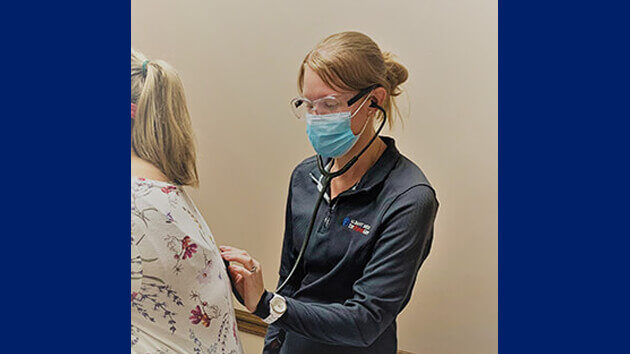Center for Physician Assistant Studies Welcomes New Class

This week, the Center for Physician Assistant Studies at Albany Medical College welcomes its incoming class of 42 new students to campus.
Physician assistants, or PAs, are clinicians with master’s degree-level training and they represent one of the fastest-growing professions in the U.S. PAs first came on the scene in the late 1960s to help address a national shortage in primary care physicians. The first-ever class graduated from the Duke University PA Program in 1967, and, five short years later, Albany Medical College established its own program—only the 11th in the nation at the time.
Now a mainstay in PA education, the Center for Physician Assistant Studies turns out 42 PAs a year, highly qualified clinicians who, in collaboration with a physician or surgeon, can diagnose, treat, prescribe medication and often serve as the principal health care provider for patients.
The class of 2023 was selected from more than 3,325 applicants. Roughly half of the class hails from New York state with additional representation from points across the U.S., including Texas, Florida and Washington state.
“We’re very excited to welcome these students to campus,” said Nathan Gardner, MS, PA-C, ’07, director of the Center for Physician Assistant Studies. “They are a very strong group of learners and we look forward to their energy and contributions.”
Gardner explained that the popularity of the PA career path springs, in part, from the professional flexibility the degree affords. “Because we’re trained as generalists,” he said, “PAs are able to practice in any field of medicine—and change at any time—without having to go through additional formal schooling or residency.” Gardner, himself a 2007 graduate of the program, provided care to patients in disciplines as varied as neonatology, primary care, hospitalist medicine, and physical medicine and rehabilitation, before transitioning to his leadership role in education.
Of course, rigorous study precedes a PA’s ability to make these fluid transitions. The PA curriculum is based on a medical school model and includes intensive course work in basic, medical and behavioral sciences as well as thousands of hours of clinical rotations.
Many graduates of Center for Physician Assistant Studies have chosen to stay on and practice at Albany Med.
“I felt very prepared when I graduated from the program,” said Brad Palmer, RPA-C, ’08, a surgical PA who has worked closely with Director of Orthopedic Oncology Matthew DiCaprio, MD, for the past 12 years. Among his many responsibilities, Palmer consults with patients, provides support in the operating room and teaches Albany Med’s PA students, providing instruction on orthopedic oncology, bone infections and other topics.
He and Dr. DiCaprio are “practically like family, at this point,” he said, given the close nature of their work. “I lean on him. He leans on me. The goal of our team—and I include our ASA and our medical assistant in this—is to care for the whole person. Yes, we’re focused on the hard bone or the tumor. But our patients’ well-being is as important to us as their clinical health.”
While Palmer provides care to a very specific patient population, Cindy Coons, PA-C, ’13, (pictured) is liable to see patients with a broad range of conditions on any given day in her work as an EmUrgentCare PA. There are the colds and the sprained ankles and the Covid tests. There are also heart attacks, severe allergy reactions, strokes.
More often than not, Coons will care for a patient from the beginning of their visit to the end without the intervention of a physician. Doctors are always on hand, of course, to consult and advise, and Coons greatly values their input. Yet she estimates she is able to treat upwards of 90 percent of the patients she sees more or less independently. She appreciates the autonomy she has, in addition to the satisfaction she feels in a job that is centered around helping people.
“I was pre-med in college,” she said. “After I learned what PAs did, I began to think that might be a better fit for me. It’s been a great career path. I’ve been able to shape my work life—my hours and my schedule—to fit my family’s growth. And I love the variety of cases I see in emergent care. For me, this job was never a stepping stone. It was the end stop—my chosen career. I think most PAs feel the same way.”
At Albany Med, PAs are found across the institution—in areas as diverse as robotic surgery, pediatric wound care, and the Alden March Bioethics Institute. And many of them are “home grown,” thanks to the Center for Physician Assistant Studies. “Our students benefit from the exceptional learning environment we are able to provide at the College—and our patients, in turn, benefit when our graduates choose to stay on and pursue their careers here,” Gardner said. “It’s a good marriage.”